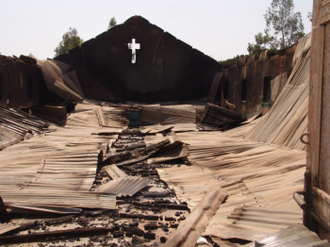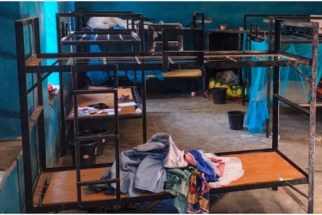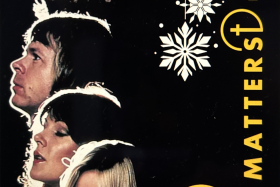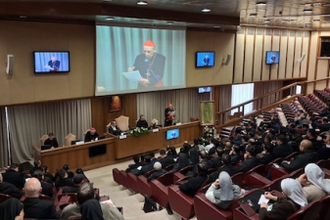Viewpoint: Is UK ignoring the Jihad against Black Christians?

A new report estimates that more Nigerian Christians are being killed by Islamist herdsmen than by the notorious jihadist militia, Boko Haram. In the first six months of 2018, the International Crisis Group says 1,300 have died in the middle belt region of the West African country.
Yet, despite the evidence, the UK Foreign Office resists recognising the central role of fundamentalist Islamism in fuelling the violence. In a series of Parliamentary answers and letters, the Foreign Office minister, Lord Ahmad, has disputed the widely accepted fact that the Fulani militias are Muslims and their victims are Christian.
The Foreign Office is not alone in averting its eyes from the impact of radicalisation. In his Mandela centenary speech, Barack Obama savage the European colonial powers for exploiting Africa. Yet, he ignored the Arabs' central role in the historic slave trade and the continuing Islamist jihad against black Africans in Nigeria and Sudan. By focusing solely on European sins, Obama missed an opportunity to stand up for the millions of black Africans facing ethnic cleansing by Islamists who regard them as racially inferior. Has he not noticed that some Arab media routinely call him "N***** Obama"?
Readers of ICN might reasonable think all societies are capable of racism, just as most cultures have had slaves at one point in their history. Despite this, some continue to insist their race or religion is the exception. For instance, a Palestinian rights campaigner told me, "I always address blacks as abid [slave]. But it's unacceptable to suggest Arabs are racist - we can't be. We're victims."
The Turkish leader, Recep Tayyip Erdogan, defended Sudanese president Omar Bashir from charges of genocide in Darfur, saying, "It is not possible for a Muslim to commit genocide." Equally unequivocal was President Bashir's assertion that no Sudanese man has ever committed rape. He said, "It is not in the Sudanese culture or the people of Darfur to rape. It doesn't exist." He was implying that all the women raped by his soldiers and proxies were prostitutes or liars.
Set against this mindset are the experiences of millions of black Africans and African Christians. African intellectuals claim the root of current prejudice lies in the Arab slave trade, which pre-dates the Atlantic one. Between 650 and 1905, 17 million black Africans were traded by Arabs.
Few Arab scholars have examined Arab responsibility for the historic enslavement and deaths of millions of black Africans. Moreover, even though slavery was legal in Saudi Arabia until 1960, there has never been an Arab abolitionist movement. Tunisia was the first Arab country to abolish slavery, not by popular demand but after its ruler, Ahmed I Bey, was convinced by a British Army officer, Thomas Reade. Tunisia still leads the way: it recently outlawed discrimination on the basis of race.
SUDAN AND NIGERIA
The late Al Qaeda leader, Osama Bin Laden, said, "When an Arab looks at a black African, he sees a slave." A deadly manifestation of this attitude is found in modern Sudan and Nigeria. Yet, Western officials shy away from the obvious racial and religious motivation behind the jihadis. Lord Alton of Liverpool has repeatedly pressed the UK Foreign Office to recognise that the Fulani herdsmen targeting Christian communities in Nigeria's middle belt are exclusively Muslim, while their victims are Christians. Ministers condemn all sides for the violence, while ignoring the fact that far more Christians have been killed.
"Without understanding the Fulani's agenda, we cannot tackle the Islamist radicalisation inspiring the deadly attacks that have left hundreds of Christian Nigerians dead just this year alone," Alton said. "The Fulani are killing more people than Boko Haram."
The situation is even worse on the other side of the continent. Since independence in 1956, Khartoum's ruling Islamist elite has imposed a vision of Sudan as a purely Arab and Muslim nation, despite centuries of intermarriage, and the presence of various ethnicities and faiths. At times employing the language of jihad, the regime has used its armed forces and proxy militias in a campaign of ethnic cleansing, starvation, land theft and aerial bombardment to create a monoculture.
It is estimated that two million Christian and animist black Africans in the southern part of Sudan (now the Republic of South Sudan) and half a million Muslim black Africans in Darfur have died as a result.
An unknown number of black Africans, both Christian and moderate Muslim, have been slaughtered or starved in the Nuba Mountains and Blue Nile state since 2011: Christian schools and hospitals are deliberately and repeatedly targeted. For instance, in 2014, a hospital at Gidel in South Kordofan was bombed eleven times in two days. The area around a hospital in Kauda was bombed sixty times in May and June 2014.
According to the Nigerian scholar, Moses Ochonu, "Arabs still generally regard the Darfur genocide as a public relations disaster rather than as a barbaric racist war against black people." For the writer, Chinweizu Ibekwe, "Sudan is a microcosm of black African's unacknowledged Arab problem, a problem of racism, colonialism and enslavement and an Arab agenda of cultural, political and territorial expansion at the expense of black Africa."
Since 2003, Human Rights Watch has documented the Sudanese air force's campaign of ethnic cleansing, bombing black African villages in Darfur, while leaving adjacent Arab villages untouched. Their proxies, the Janjaweed, and their successors, the Rapid Support Forces, have swept across Darfur, killing men and boys, raping women and girls, looting livestock and burning villages.
In 2004, survivors told Amnesty how Arab women cheered as militiamen raped black African Darfuri women, singing, "The power of al-Bashir belongs to the Arabs and we will kill you until the end, you blacks, we have killed your god. You are gorillas, you are black and you are badly dressed."
In 2004, in a camp outside El Geneina in West Darfur, a local woman told me, "When he raped me he said I was a slave and he would dilute my inferior blood. He branded me with a hot iron to show I was a slave. He said black people were created by God for his people to use as slaves. He told me my people were inferior to the Arab tribes."
Waging Peace, the NGO I founded, collected 500 drawings by Darfuri children. They show the victims with black skin, whereas the Islamists attacking them are red. This contradicts Khartoum's assurances that there is no racial element to the Darfur conflict.
According to Sudan expert Gerard Prunier, Khartoum's rulers struggle with an inferiority complex due to centuries of prejudice from their Egyptian neighbours. "In the Sudan they are 'Arabs,' but in the Arab world they are seen as mongrels who hardly deserve that name. They desperately strive for recognition of the 'Arab' status by other Arabs." The Tunisian writer, Kamel Riahi, comments, "Watch any Egyptian sitcom and tell me about the image of the Sudanese character."
"President Obama began the process of lifting sanctions against Sudan, and President Trump completed it," comments Lord Alton, who visited Darfur with me in 2004, at the height of the killing.
"Until the Islamist Sudanese regime stops targeting its black African citizens in Darfur, the Nuba Mountains and Blue Nile state, it should be isolated, not embraced. And until the UK recognises the Fulani in Nigeria are deliberately targeting Christians, our government's condemnation of the deadly violence is meaningless."
Rebecca Tinsley's novel about Sudan, 'When the Stars Fall to Earth' is available from Amazon.


















